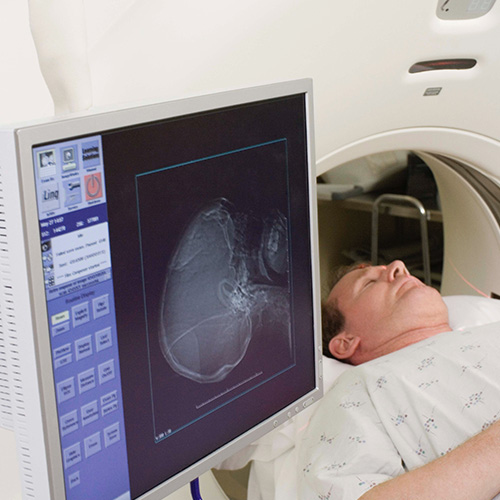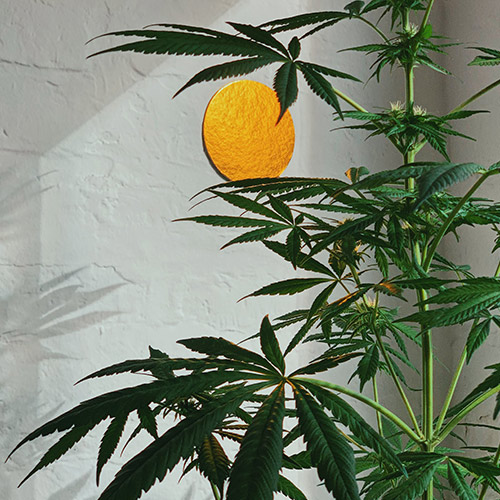Multiple sclerosis is considered a disease with a thousand faces. There are treatment options, but no cure. For a few years now, people with multiple sclerosis have had the option of applying for medical cannabis treatment under certain conditions. How this works and why MS symptoms can benefit from treatment with cannabis, we have summarized for you here.


Multiple sclerosis: What does the disease mean and what causes it?
Why MS develops has not yet been conclusively clarified. It is known that inflammatory processes in the spinal cord and brain are responsible for triggering multiple sclerosis. However, it is unknown why these inflammations occur in the first place.
Medicine often makes judgments based on experience and has conjectures. For example, various viruses are thought to play a role. In fact, multiple sclerosis also appears to be hereditary, with a 30-fold increased risk of developing the disease.
The leading symptoms include sensory disturbances, muscle complaints, and visual disturbances, which manifest themselves in varying degrees of intensity. Each affected person reports different experiences, which complicates the treatment of multiple sclerosis. Typical phenomena reported by MS patients include:
Blurred vision and pain around the eyes
- Decreased color vision
- Flashes of light and double images
- Muscle stiffness and loss of strength
- Paralysis of the extremities and face
- Decreased temperature perception
- Nerve damage such as numbness, flashes and tingling sensations
Beyond these symptoms, MS can cause other symptoms. These include incontinence, anxiety, depression, speech disorders and more.
Typical treatment of MS - these options are available to the patient
How MS sufferers are treated and which therapy option fits best depends largely on their symptoms and the severity of their disease.
Medical cannabis is only used when no other therapy is effective.
In conventional medicine, people with MS are treated with glatiramer acetate or beta-interferons if the sale is mild. In such therapies, the immune system is influenced to prevent damaging processes from aggravating the disease. The focus is primarily on anti-inflammatory properties, which can lead to an improvement in the overall picture, including pain.
Severe cases associated with high spasticity and severely affecting daily life are often treated with monoclonal antibodies. This involves blocking certain immune system receptors to prevent spread to the central nervous system. Classic immunosuppressants such as azathioprine are also helpful, according to research.
It must be remembered, however, that there is no cure for patients and that all finished medicines can only relieve the severity of symptoms.

Cannabis products as an alternative therapy - why can it work?
In the German medical journal Ärzteblatt it was reported that medical cannabis is not effective against spasticity, but could inhibit pain and also inflammation. This report refers to a study conducted in the UK. There, patients were treated with D9-tetrahydrocannabinol, cannabis extract or placebo.
While there were no relevant differences in the spastic symptoms of the people, the mobility of the affected individuals improved. THC patients saw an improvement of about 12%. Users of cannabis extracts noted a 4% improvement in mobility, on par with placebo patients.
It was striking that the subjectively described improvements did not match the objectively observed studies. For example, 60% of the cannabis group perceived a significant improvement in spasticity, but this could not be objectively demonstrated.
The studies also showed that about 54% of those affected reported less pain compared to the placebo group. It is concluded that cannabis preparations could have an effect in the treatment of MS.
However, there are also studies in multiple sclerosis/MS that provide different results. For example, a study in Switzerland found that 37 out of 50 people with MS experienced a reduction in spasticity with the use of medical cannabis.
It is clear that cannabinoids may have an important role to play in MS, but more research is needed.

Pain relief through cannabinoids - does it have to be cannabis?
The main problem with cannabis treatment is that the prescription for the patient can only be made by a doctor. The basic prerequisite for this is that medication cannot achieve sufficient effects. This is a problem in that all medications can have strong side effects. Cannabis is not free of unwanted effects either, but sometimes has a milder effect than chemical immune blockers.
Now the question is what option is there for patients. And this is where cannabinoids like CBD come into focus. There are initial studies with the result that pain and inflammation can be relieved by THC-free CBD. This would be an important alternative for patients with multiple sclerosis. The advantage here is that the MS patient can use CBD completely legally, whereas cannabis is only used when prescribed by a doctor.
Concomitant symptoms such as depression, convulsions, anxiety and restlessness could also be reduced through the use of CBD. Cannabidiol has been the subject of research for some time, as it has been deemed safe by the WHO and does not induce a psychoactive state. The frequency of use has increased significantly in recent years!

The cannabinoid receptors (CB1 and CB2) seem to be responsible for the effectiveness. They are part of the nervous system and the endocannabinoid system. Ingested cannabinoids interact with these receptors and can possibly influence the florescence of inflammation.
While this effect does not directly reduce the symptom of spasticity, it may influence the severity of inflammation. Less inflammation means fewer symptoms for MS patients. A direct comparison of the efficacy of cannabis to cannabidiol is not yet possible in practice. There are too few results available for this from research conducted on patients over the long term.
It is also unclear whether cannabis or CBD can effectively prevent disease progression. It is a desire of medicine to clearly provide relief to patients with severe symptoms. But a very different approach is to curb the progression of the disease and possibly bring it to a halt.
Even if the results are not yet clear, we should not disregard cannabis flowers, CBD and other substances in the coming years. They will be a subject of scientific investigation and the results from the UK and Switzerland already give hope for the future.


What positive results can cannabis have in multiple sclerosis?
Narcotic prescriptions are issued for MS patients only with extreme caution. Cannabis is still banned in most parts of Europe and so it may only be used when classical medicine does not help.
If such a prescription is available, cannabis can be used in multiple sclerosis in various forms. There are cannabinoids as a spray, as a ready-to-use medicine, but also in the form of flowers. In Germany, negotiations are currently underway to legalize cannabis and no longer criminalize personal use. This would significantly improve the availability of cannabinoids for MS patients and could have a positive impact on treatment options.
It must be clear that cannabinoids will not be a cure for MS, even if the available studies are positive. The primary goal, then, is to use cannabinoids to more effectively alleviate symptoms while reducing the number of potential side effects.
Flower extracts based on THC pose a greater risk of side effects. In particular, dizziness, cravings, and also pronounced drowsiness have been reported. Cannabis flowers based on CBD, on the other hand, are not psychoactive and therefore have milder effects and side effects. High doses in particular can become a problem here and trigger nausea, gastrointestinal complaints or fatigue.
However, the body quickly gets used to treatment with CBD, which in turn reduces side effects during therapy.
Conclusion: Patients with multiple sclerosis can benefit from cannabis
Compared to a placebo, more than one study showed that patients with multiple sclerosis/MS can benefit from cannabis flower. Since cannabis products are still not legally available, to date, patients have to rely on the appropriate indications and need a physician to write a prescription. As an alternative, it is possible to use cannabinoids such as CBD completely legally and without a prescription. The ability to interact with cannabinoid receptors is also present with CBD.
It is important that patients are not allowed to stop taking their medications, even if the active ingredients of cannabis reduce inflammation and pain is also reduced. A doctor for advice and guidance is always needed, because the symptomatology of MS can be very treacherous.
Fortunately, the medical community is also becoming more open to studies on CBD, cannabis and cannabinoids in general. So in the future, it may be conceivable that sufferers can reduce their symptoms not only with finished medicines, but also with the help of cannabis treatment.



